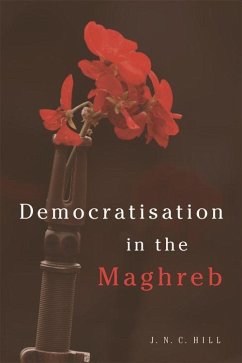'J. N. C. Hill has produced a convincing account of politics in the Maghreb which is theoretically sophisticated and filled with empirical insight. It is particularly valuable for its inclusion of the case of Mauritania alongside those of Tunisia, Algeria and Morocco, and deserves a wide readership among scholars and students alike.' Vincent Durac, School of Politics and International Relations, University College Dublin The book offers fresh insight into the recent political development and contrasting experiences of four Maghreb countries: Tunisia, Algeria, Morocco and Mauritania. The Arab Spring affected them in different ways. Tunisia underwent profound change as Ben Ali was overthrown in a fortnight. Yet in Algeria, President Bouteflika won an unprecedented fourth term in office despite being too ill to campaign. What explains these variations? Why did Ben Ali's regime fall and Bouteflika's survive? Why has Morocco not gone the same way as Tunisia? And what of Mauritania, the often forgotten other Maghreb country? This book addresses these and other questions by using Steven Levitsky and Lucan Way's celebrated model for examining regime transitions to analyse and compare the political development of Tunisia, Algeria, Morocco and Mauritania over the last ten years. Key Features - Contextualises and charts the recent political progress of Tunisia, Algeria, Morocco and Mauritania - Examines Mauritania, the frequently ignored other Maghreb country - Applies Levitsky and Way's model to new case studies, to better explain their political transitions - Tests and develops Levitsky and Way's ideas about history and geography, unelected executives, ruling parties, the relationship between coercion and organisational power, and Western intent J. N. C Hill is Reader in Postcolonialism and the Maghreb in the Defence Studies Department at King's College London. He is the author of Identity in Algerian Politics: The Legacy of Colonial Rule (2009). Cover image: Demonstrators place flowers in the barrels of soldiers' guns, Tunis, Tunisia, 2011 (c) Christopher Furlong/Getty Images Cover design: [EUP logo] edinburghuniversitypress.com ISBN 978-1-4744-0897-4 Barcode
Hinweis: Dieser Artikel kann nur an eine deutsche Lieferadresse ausgeliefert werden.
Hinweis: Dieser Artikel kann nur an eine deutsche Lieferadresse ausgeliefert werden.








